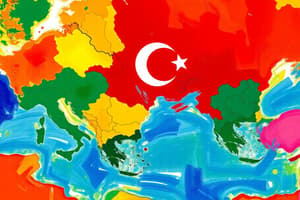Podcast
Questions and Answers
Osmanlı İmparatorluğu'nun timar sistemi, hangi kavram üzerine kuruldu?
Osmanlı İmparatorluğu'nun timar sistemi, hangi kavram üzerine kuruldu?
Timar sisteminin merkezi otoritesi kimdi?
Timar sisteminin merkezi otoritesi kimdi?
Osmanlı İmparatorluğu'nda timar sistemi, hangi sistemle benzerlik gösterir?
Osmanlı İmparatorluğu'nda timar sistemi, hangi sistemle benzerlik gösterir?
Timar sisteminin temel amacı nedir?
Timar sisteminin temel amacı nedir?
Signup and view all the answers
Timar sistemi Avrupa feodalizminden hangi anlamda farklıdır?
Timar sistemi Avrupa feodalizminden hangi anlamda farklıdır?
Signup and view all the answers
Timariotlar hangi sorumluluğu taşımaktaydı?
Timariotlar hangi sorumluluğu taşımaktaydı?
Signup and view all the answers
Osmanlı İmparatorluğu'nun timar sistemi hangi kurumdan etkilendi?
Osmanlı İmparatorluğu'nun timar sistemi hangi kurumdan etkilendi?
Signup and view all the answers
Timar sisteminde, toprak dağıtımında hangi ilke kullanılır?
Timar sisteminde, toprak dağıtımında hangi ilke kullanılır?
Signup and view all the answers
Study Notes
Ottoman Empire's Timar System: Feudalism
The Ottoman Empire's timar system was a unique blend of feudalism and Islamic institutions. Here are the key points:
Feudalism in the Ottoman Empire
- The Ottoman Empire's timar system was based on the concept of iqta', which was a type of feudal grant where land was granted to cavalry officers in exchange for military service.
- The Ottoman Empire adopted and adapted the iqta' system from the Seljuk Turks and the Abbasid Caliphate.
- The timar system was a decentralized system of governance, where the central authority granted lands to timariots (cavalry officers) in exchange for military service and loyalty.
Characteristics of Feudalism in the Ottoman Empire
- Vassalage: The relationship between the timariots and the Sultan was based on a vassalage system, where the timariots owed loyalty and military service to the Sultan in exchange for land and protection.
- Fiefs: The lands granted to timariots were called timars, which were similar to fiefs in European feudalism.
- Military Service: The primary obligation of timariots was to provide military service to the Sultan, which included participating in battles and maintaining law and order in their territories.
- Taxation: Timariots were responsible for collecting taxes from the peasants and villagers living in their timars.
Differences from European Feudalism
- Lack of Primogeniture: In the Ottoman Empire, the timar was not passed down to the eldest son, unlike in European feudalism. Instead, the Sultan had the power to grant or revoke timars at his discretion.
- Centralized Authority: The Ottoman Empire's timar system was more centralized than European feudalism, with the Sultan maintaining control over the timariots and the lands they governed.
Impact of the Timar System on the Ottoman Empire
- Stability and Prosperity: The timar system helped to maintain stability and prosperity in the Ottoman Empire, as it provided a system of governance and resource allocation that was efficient and effective.
- Military Strength: The timar system enabled the Ottoman Empire to maintain a strong and loyal military, which was crucial for its expansion and defense.
Osmanlı İmparatorluğu'nun Timar Sistemi: Feodalizm
Osmanlı İmparatorluğu'nda Feodalizm
- İkta' kavramına dayalı olan timar sistemi, süvari subaylarına askeri hizmet karşılığı verilmekteydi.
- Osmanlı İmparatorluğu, ikta' sistemini Selçuk Türkleri ve Abbasi Halifeliği'nden aldı ve uyarladı.
- Merkezi otorite, timar sahiplerine askeri hizmet karşılığı toprak veriyor ve karşılığında askerî hizmet ve sadakat bekliyordu.
Osmanlı İmparatorluğu'nda Feodalizmin Özellikleri
- Vassallık: Timar sahipleri ve Sultan arasındaki ilişki, vassallık sistemi üzerine kurulmuştu, timar sahipleri Sultan'a sadakat ve askerî hizmet borcu altına giriyorlardı.
- Fief: Timar sahiplerine verilen topraklar, Avrupa feodalizmindeki fief'lere benzerdi.
- Askerî Hizmet: Timar sahiplerinin ana yükümlülüğü, Sultan'a askerî hizmet sağlamak ve topraklarında düzeni sağlamaktı.
- Vergilendirme: Timar sahipleri, topraklarında yaşayan köylülerden ve köylerden vergi topluyordu.
Avrupa Feodalizmleri'nden Farkları
- Birinci Kalemi Miras: Osmanlı İmparatorluğu'nda, timar en yaşlı oğlu gibi Avrupa feodalizminde değil, Sultan'ın inisiyatifine göre veriliyor veya geri alınıyordu.
- Merkezi Otorite: Osmanlı İmparatorluğu'nun timar sistemi, Avrupa feodalizminden daha merkezi idi, Sultan, timar sahiplerine ve yönettiği topraklara kontrol sahibiydi.
Timar Sistemi'nin Osmanlı İmparatorluğu'na Etkisi
- Stabilite ve Büyüme: Timar sistemi, Osmanlı İmparatorluğu'nda istikrar ve büyümeye yardımcı oldu, çünkü yönetişimi ve kaynak dağıtımını etkin ve verimli bir sistem sundu.
- Askerî Kuvvet: Timar sistemi, Osmanlı İmparatorluğu'nun güçlü ve sadık bir askeri sağlamasına yardımcı oldu, ki bu da genişleme ve savunma için kritikti.
Studying That Suits You
Use AI to generate personalized quizzes and flashcards to suit your learning preferences.
Description
Osmanlı İmparatorluğu'nda kullanılan timar sisteminin βασicsini keşfedin. Bu sistem, İslam kurumlarıyla birlikte feodalizmin benzersiz bir karışımıdır.




